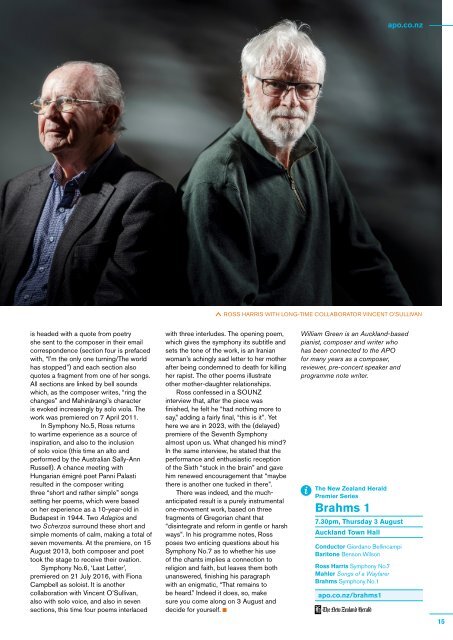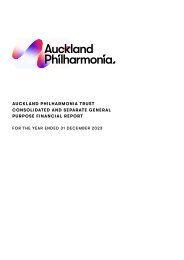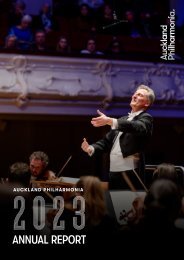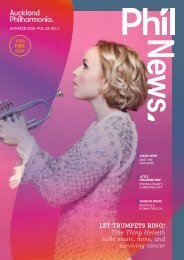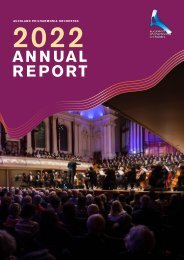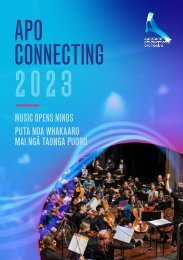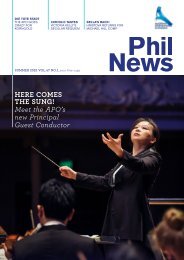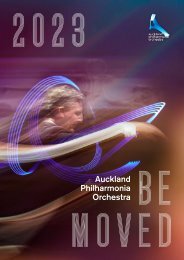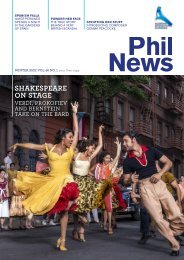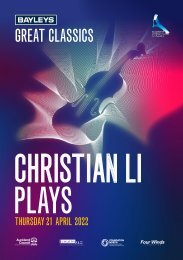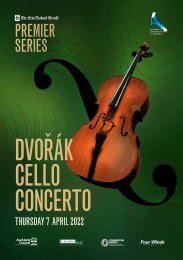You also want an ePaper? Increase the reach of your titles
YUMPU automatically turns print PDFs into web optimized ePapers that Google loves.
apo.co.nz<br />
ROSS HARRIS WITH LONG-TIME COLLABORATOR VINCENT O’SULLIVAN<br />
is headed with a quote from poetry<br />
she sent to the composer in their email<br />
correspondence (section four is prefaced<br />
with, “I’m the only one turning/The world<br />
has stopped”) and each section also<br />
quotes a fragment from one of her songs.<br />
All sections are linked by bell sounds<br />
which, as the composer writes, “ring the<br />
changes” and Mahinārangi’s character<br />
is evoked increasingly by solo viola. The<br />
work was premiered on 7 April 2011.<br />
In Symphony No.5, Ross returns<br />
to wartime experience as a source of<br />
inspiration, and also to the inclusion<br />
of solo voice (this time an alto and<br />
performed by the Australian Sally-Ann<br />
Russell). A chance meeting with<br />
Hungarian émigré poet Panni Palasti<br />
resulted in the composer writing<br />
three “short and rather simple” songs<br />
setting her poems, which were based<br />
on her experience as a 10-year-old in<br />
Budapest in 1944. Two Adagios and<br />
two Scherzos surround these short and<br />
simple moments of calm, making a total of<br />
seven movements. At the premiere, on 15<br />
August 2013, both composer and poet<br />
took the stage to receive their ovation.<br />
Symphony No.6, ‘Last Letter’,<br />
premiered on 21 July 2016, with Fiona<br />
Campbell as soloist. It is another<br />
collaboration with Vincent O’Sullivan,<br />
also with solo voice, and also in seven<br />
sections, this time four poems interlaced<br />
with three interludes. The opening poem,<br />
which gives the symphony its subtitle and<br />
sets the tone of the work, is an Iranian<br />
woman’s achingly sad letter to her mother<br />
after being condemned to death for killing<br />
her rapist. The other poems illustrate<br />
other mother-daughter relationships.<br />
Ross confessed in a SOUNZ<br />
interview that, after the piece was<br />
finished, he felt he “had nothing more to<br />
say,” adding a fairly final, “this is it”. Yet<br />
here we are in <strong>2023</strong>, with the (delayed)<br />
premiere of the Seventh Symphony<br />
almost upon us. What changed his mind?<br />
In the same interview, he stated that the<br />
performance and enthusiastic reception<br />
of the Sixth “stuck in the brain” and gave<br />
him renewed encouragement that “maybe<br />
there is another one tucked in there”.<br />
There was indeed, and the muchanticipated<br />
result is a purely instrumental<br />
one-movement work, based on three<br />
fragments of Gregorian chant that<br />
“disintegrate and reform in gentle or harsh<br />
ways”. In his programme notes, Ross<br />
poses two enticing questions about his<br />
Symphony No.7 as to whether his use<br />
of the chants implies a connection to<br />
religion and faith, but leaves them both<br />
unanswered, finishing his paragraph<br />
with an enigmatic, “That remains to<br />
be heard.” Indeed it does, so, make<br />
sure you come along on 3 August and<br />
decide for yourself.<br />
William Green is an Auckland-based<br />
pianist, composer and writer who<br />
has been connected to the <strong>APO</strong><br />
for many years as a composer,<br />
reviewer, pre-concert speaker and<br />
programme note writer.<br />
The New Zealand Herald<br />
Premier Series<br />
Brahms 1<br />
7.30pm, Thursday 3 August<br />
Auckland Town Hall<br />
Conductor Giordano Bellincampi<br />
Baritone Benson Wilson<br />
Ross Harris Symphony No.7<br />
Mahler Songs of a Wayfarer<br />
Brahms Symphony No.1<br />
apo.co.nz/brahms1<br />
15


